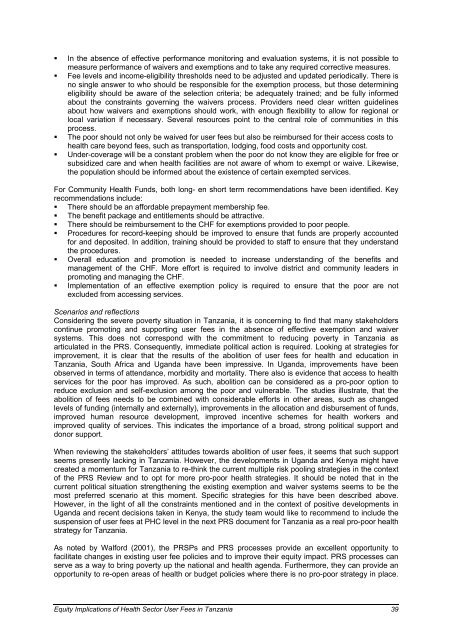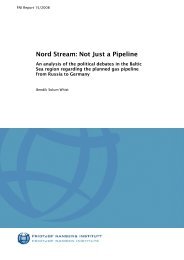equity implications of health sector user fees in tanzania
equity implications of health sector user fees in tanzania
equity implications of health sector user fees in tanzania
Create successful ePaper yourself
Turn your PDF publications into a flip-book with our unique Google optimized e-Paper software.
� In the absence <strong>of</strong> effective performance monitor<strong>in</strong>g and evaluation systems, it is not possible to<br />
measure performance <strong>of</strong> waivers and exemptions and to take any required corrective measures.<br />
� Fee levels and <strong>in</strong>come-eligibility thresholds need to be adjusted and updated periodically. There is<br />
no s<strong>in</strong>gle answer to who should be responsible for the exemption process, but those determ<strong>in</strong><strong>in</strong>g<br />
eligibility should be aware <strong>of</strong> the selection criteria; be adequately tra<strong>in</strong>ed; and be fully <strong>in</strong>formed<br />
about the constra<strong>in</strong>ts govern<strong>in</strong>g the waivers process. Providers need clear written guidel<strong>in</strong>es<br />
about how waivers and exemptions should work, with enough flexibility to allow for regional or<br />
local variation if necessary. Several resources po<strong>in</strong>t to the central role <strong>of</strong> communities <strong>in</strong> this<br />
process.<br />
� The poor should not only be waived for <strong>user</strong> <strong>fees</strong> but also be reimbursed for their access costs to<br />
<strong>health</strong> care beyond <strong>fees</strong>, such as transportation, lodg<strong>in</strong>g, food costs and opportunity cost.<br />
� Under-coverage will be a constant problem when the poor do not know they are eligible for free or<br />
subsidized care and when <strong>health</strong> facilities are not aware <strong>of</strong> whom to exempt or waive. Likewise,<br />
the population should be <strong>in</strong>formed about the existence <strong>of</strong> certa<strong>in</strong> exempted services.<br />
For Community Health Funds, both long- en short term recommendations have been identified. Key<br />
recommendations <strong>in</strong>clude:<br />
� There should be an affordable prepayment membership fee.<br />
� The benefit package and entitlements should be attractive.<br />
� There should be reimbursement to the CHF for exemptions provided to poor people.<br />
� Procedures for record-keep<strong>in</strong>g should be improved to ensure that funds are properly accounted<br />
for and deposited. In addition, tra<strong>in</strong><strong>in</strong>g should be provided to staff to ensure that they understand<br />
the procedures.<br />
� Overall education and promotion is needed to <strong>in</strong>crease understand<strong>in</strong>g <strong>of</strong> the benefits and<br />
management <strong>of</strong> the CHF. More effort is required to <strong>in</strong>volve district and community leaders <strong>in</strong><br />
promot<strong>in</strong>g and manag<strong>in</strong>g the CHF.<br />
� Implementation <strong>of</strong> an effective exemption policy is required to ensure that the poor are not<br />
excluded from access<strong>in</strong>g services.<br />
Scenarios and reflections<br />
Consider<strong>in</strong>g the severe poverty situation <strong>in</strong> Tanzania, it is concern<strong>in</strong>g to f<strong>in</strong>d that many stakeholders<br />
cont<strong>in</strong>ue promot<strong>in</strong>g and support<strong>in</strong>g <strong>user</strong> <strong>fees</strong> <strong>in</strong> the absence <strong>of</strong> effective exemption and waiver<br />
systems. This does not correspond with the commitment to reduc<strong>in</strong>g poverty <strong>in</strong> Tanzania as<br />
articulated <strong>in</strong> the PRS. Consequently, immediate political action is required. Look<strong>in</strong>g at strategies for<br />
improvement, it is clear that the results <strong>of</strong> the abolition <strong>of</strong> <strong>user</strong> <strong>fees</strong> for <strong>health</strong> and education <strong>in</strong><br />
Tanzania, South Africa and Uganda have been impressive. In Uganda, improvements have been<br />
observed <strong>in</strong> terms <strong>of</strong> attendance, morbidity and mortality. There also is evidence that access to <strong>health</strong><br />
services for the poor has improved. As such, abolition can be considered as a pro-poor option to<br />
reduce exclusion and self-exclusion among the poor and vulnerable. The studies illustrate, that the<br />
abolition <strong>of</strong> <strong>fees</strong> needs to be comb<strong>in</strong>ed with considerable efforts <strong>in</strong> other areas, such as changed<br />
levels <strong>of</strong> fund<strong>in</strong>g (<strong>in</strong>ternally and externally), improvements <strong>in</strong> the allocation and disbursement <strong>of</strong> funds,<br />
improved human resource development, improved <strong>in</strong>centive schemes for <strong>health</strong> workers and<br />
improved quality <strong>of</strong> services. This <strong>in</strong>dicates the importance <strong>of</strong> a broad, strong political support and<br />
donor support.<br />
When review<strong>in</strong>g the stakeholders’ attitudes towards abolition <strong>of</strong> <strong>user</strong> <strong>fees</strong>, it seems that such support<br />
seems presently lack<strong>in</strong>g <strong>in</strong> Tanzania. However, the developments <strong>in</strong> Uganda and Kenya might have<br />
created a momentum for Tanzania to re-th<strong>in</strong>k the current multiple risk pool<strong>in</strong>g strategies <strong>in</strong> the context<br />
<strong>of</strong> the PRS Review and to opt for more pro-poor <strong>health</strong> strategies. It should be noted that <strong>in</strong> the<br />
current political situation strengthen<strong>in</strong>g the exist<strong>in</strong>g exemption and waiver systems seems to be the<br />
most preferred scenario at this moment. Specific strategies for this have been described above.<br />
However, <strong>in</strong> the light <strong>of</strong> all the constra<strong>in</strong>ts mentioned and <strong>in</strong> the context <strong>of</strong> positive developments <strong>in</strong><br />
Uganda and recent decisions taken <strong>in</strong> Kenya, the study team would like to recommend to <strong>in</strong>clude the<br />
suspension <strong>of</strong> <strong>user</strong> <strong>fees</strong> at PHC level <strong>in</strong> the next PRS document for Tanzania as a real pro-poor <strong>health</strong><br />
strategy for Tanzania.<br />
As noted by Walford (2001), the PRSPs and PRS processes provide an excellent opportunity to<br />
facilitate changes <strong>in</strong> exist<strong>in</strong>g <strong>user</strong> fee policies and to improve their <strong>equity</strong> impact. PRS processes can<br />
serve as a way to br<strong>in</strong>g poverty up the national and <strong>health</strong> agenda. Furthermore, they can provide an<br />
opportunity to re-open areas <strong>of</strong> <strong>health</strong> or budget policies where there is no pro-poor strategy <strong>in</strong> place.<br />
Equity Implications <strong>of</strong> Health Sector User Fees <strong>in</strong> Tanzania 39













